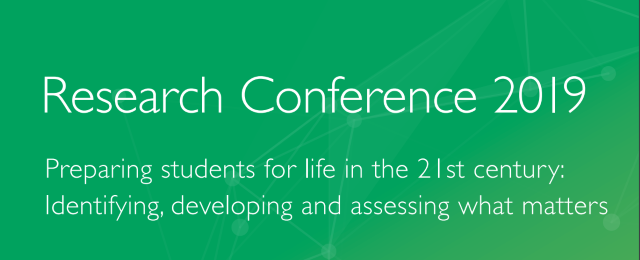
Monday 5 August 2019
Start Date
5-8-2019 10:30 AM
End Date
5-8-2019 11:30 AM
Subjects
Adults, International surveys, Adult literacy, Numeracy, Reading skills, Basic skills, Competence, Generic skills, Definitions, Beginning teachers
Abstract
The Programme for International Assessment of Adult Competencies (PIAAC) is an international survey of adult skills that covers reading literacy, numeracy and problem-solving of 16-to-65-year-old adults. This paper focuses on the development and evolution of the reading and numeracy aspects of PIAAC and presents an overview of Australian performance in PIAAC, the social and economic outcomes associated with literacy and numeracy proficiency and the literacy and numeracy standards for graduating teachers.
Recommended Citation
Mendelovits, J., & Tout, D. (2019, August 05). Not just for the kids: Adult skills in the 21st century [Paper presentation]. Research Conference 2019 - Preparing students for life in the 21st century: Identifying, developing and assessing what matters. https://research.acer.edu.au/research_conference/RC2019/5august/2
Recommended Citation (OVERRIDE)
Mendelovits, J. Tout, D. (August 2019). Not just for the kids: Adult skills in the 21st century. In K. Cockle (Ed.), Research Conference 2019: Preparing students for life in the 21st century: Identifying, developing and assessing what matters: Proceedings and Program: 4–5 August 2019, Melbourne Convention and Exhibition Centre. (pp.38-45). https://research.acer.edu.au/cgi/viewcontent.cgi?article=1352&context=research_conference
Copyright Statement
Copyright Australian Council for Educational Research 2019
Place of Publication
Melbourne, Australia
Publisher
Australian Council for Educational Research (ACER)
ISBN
9781742865546
Not just for the kids: Adult skills in the 21st century
The Programme for International Assessment of Adult Competencies (PIAAC) is an international survey of adult skills that covers reading literacy, numeracy and problem-solving of 16-to-65-year-old adults. This paper focuses on the development and evolution of the reading and numeracy aspects of PIAAC and presents an overview of Australian performance in PIAAC, the social and economic outcomes associated with literacy and numeracy proficiency and the literacy and numeracy standards for graduating teachers.

